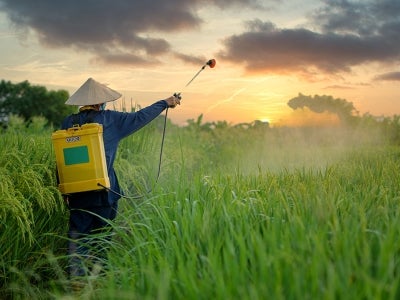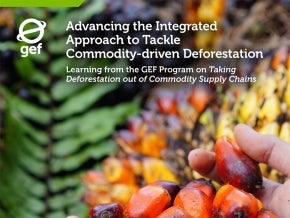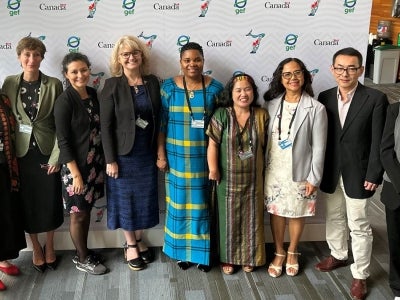
Efforts to protect landscapes are prioritizing gender equality as a means to reduce poverty and deliver a more sustainable tomorrow, a theme of this year’s International Women’s Day.
“How, why, and where rural men and women access, use, and manage forests and trees is often different,” said Patti Kristjanson, a senior gender specialist with the Food Systems, Land Use and Restoration (FOLUR) impact program, funded by the Global Environment Facility and led by the World Bank.
The FOLUR program is designed to transform the global food system by addressing barriers that stand in the way of more environmentally sustainable food supply chains in 27 countries, with a focus on eight commodities, including beef, cocoa, coffee, maize, palm oil, rice, soy, and wheat.
Advancing gender equality is a central part of its integrated approach, along with an emphasis on inclusive, participatory landscape planning in partnership with local communities.
Both women and men make key contributions across commodity value chains, agricultural landscapes, and forest sectors as farmers, workers, processors, and entrepreneurs. Their roles differ according to region, however, and many women dependent on forest and farming landscapes face many obstacles to moving out of poverty.
Men tend to dominate more lucrative hunting, wood harvesting, and mineral extraction activities, while women are more likely to sell fruit, nuts, berries, and medicinal plants.
Weak women’s land tenure rights and economic migration can also exacerbate gender-related challenges, when men leave to find work elsewhere and women face limitations to their agency to manage agricultural and forested areas.
“Collecting and selling forest products can provide women with additional income, reduce their labor burden, and improve dietary diversity. It can also conversely increase their burden if the sole responsibility falls on them in addition to childcare and household duties,” Kristjanson said.
“They may also face challenges retaining control over profits, accessing capital and technology, receiving fewer benefits than men from their labor, who may exclude them from profits derived from higher income commodities such as coffee and cocoa,” she said.
Each of FOLUR’s projects will include a gender component coordinated by Kristjanson, aimed at identifying how men and women experience and benefit from commodity value chains differently, integrating gender equity into policies and practices related to landscape work.
The goal of these efforts is to acknowledge and address entrenched and systemic traditions and practices, which can have significant implications for how women access and contribute to improvements to commodity value chains.
This may include earmarking training and technical assistance for women and youth on leadership, forest management, forest restoration and agroforestry practices, with a focus on appropriate tree species for men and women, which will lay the foundations for diversification.
Performance-based contracts for planting and protecting trees on farms, as well as near and inside forests can also help equal the playing field for producers.
Developing participatory community forest management plans that put women in leadership positions in committees can encourage equal representation and address disparities in access, compounded by complex land tenure.
Innovative tools and approaches to reach women and youth can include participatory resource mapping, citizen science, social media, crowd sourcing, and technologies that enable direct, performance-based payments to women for tree and forest management-related activities.
Communication and knowledge-sharing efforts can further target diverse rural audiences, such as “edutainment” shows highlighting female farmers or foresters.
Other expected initiatives will include supporting efforts by providing targeted communication channels and feedback mechanisms to potential female applicants of forest landscape projects; facilitating registration for forest-related programs in easily accessible spaces women frequent; and training and hiring female technical advisors.
FOLUR will also work with commodity coalitions to encourage the adoption of proactive measures aimed at closing gender gaps and empowering women with sustainability standards and certifications.
“By testing gender-transformative approaches with rural women dependent on forest and agricultural landscapes, we will see improved livelihoods for women – progressing towards climate and development goals,” Kristjanson said.
Adding to the complexity of the program, research shows that male and female roles differ according to region.
“Closing gender gaps can help women better access services, markets, hire labor, and strengthen their land and tree tenure rights,” Kristjanson said, noting that women also face a greater burden of risk from climate change and its impacts on landscapes, one of the findings from the most recent report from the Intergovernmental Panel on Climate Change (IPCC).
“For those who may think a transformation to more sustainable and climate resilient food systems and tackling gender inequalities in society are separate issues, the IPCC report points out that: ‘Increasing social and gender equity is an integral part of the technological and social transitions and transformation toward climate resilient development’,” Kristjanson said.
In FOLUR and across the environmental initiatives it supports, the GEF is working to address gender gaps and support the empowerment of women. Its Policy and Guidance on Gender Equality, requires that gender considerations be systematically addressed in GEF-funded projects and programs – from design to implementation and evaluation – including through the collection and use of gender-disaggregated data.


